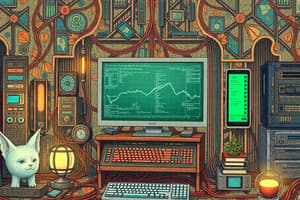Podcast
Questions and Answers
What does Information Technology primarily involve?
What does Information Technology primarily involve?
- Only data storage methods
- Only software applications
- Only networking devices
- The use of computers, networks, and electronic devices to manage data (correct)
Which of the following is NOT considered a key component of Information Technology?
Which of the following is NOT considered a key component of Information Technology?
- Social Media (correct)
- Data Management
- Hardware
- Networks
What is the primary focus of cybersecurity within Information Technology?
What is the primary focus of cybersecurity within Information Technology?
- Developing application software
- Increasing internet speed
- Enhancing user interfaces
- Protecting systems and data from threats (correct)
Which of these is a primary advantage of using Information Technology in decision making?
Which of these is a primary advantage of using Information Technology in decision making?
Which area of Information Technology focuses on creating systems that mimic human cognitive functions?
Which area of Information Technology focuses on creating systems that mimic human cognitive functions?
What technology connects various devices to the internet for data exchange, constituting a significant current trend?
What technology connects various devices to the internet for data exchange, constituting a significant current trend?
What does Cloud Computing primarily provide to users?
What does Cloud Computing primarily provide to users?
Which of the following roles is least likely to be classified under Information Technology careers?
Which of the following roles is least likely to be classified under Information Technology careers?
What is the role of data warehousing in Information Technology?
What is the role of data warehousing in Information Technology?
Which trend involves using immersive technologies to enhance user experiences?
Which trend involves using immersive technologies to enhance user experiences?
Study Notes
Definition of Information Technology (IT)
- IT refers to the use of computers, networks, and other electronic devices to store, retrieve, transmit, and manipulate data.
- Encompasses both hardware (physical devices) and software (applications and operating systems).
Key Components of Information Technology
-
Hardware
- Physical components of computers and networks (e.g., servers, workstations, routers).
-
Software
- Applications and operating systems that run on hardware.
- Includes systems software (e.g., OS) and application software (e.g., word processors, databases).
-
Networks
- Technologies that connect computers and devices for communication.
- Includes LAN (Local Area Network), WAN (Wide Area Network), and the internet.
-
Data Management
- Techniques for collecting, storing, and analyzing data.
- Includes databases, data warehousing, and data mining.
Areas of Information Technology
-
Information Systems
- Integrated systems for managing and processing information.
-
Cybersecurity
- Protecting systems and data from cyber threats and unauthorized access.
-
Cloud Computing
- Delivering computing services (storage, processing) over the internet.
-
Artificial Intelligence (AI)
- Systems that simulate human intelligence for tasks such as learning and problem-solving.
-
Networking
- Design and management of networks that facilitate communication and data exchange.
Importance of Information Technology
-
Efficiency
- Streamlines processes and improves productivity.
-
Communication
- Enhances communication within and between organizations.
-
Accessibility
- Provides access to information and resources anytime, anywhere.
-
Decision Making
- Facilitates data analysis, leading to informed business decisions.
Current Trends in Information Technology
-
Big Data
- Managing and analyzing large sets of data for insights.
-
Internet of Things (IoT)
- Connecting everyday devices to the internet for data exchange.
-
Blockchain
- Distributed ledger technology for secure transactions and data integrity.
-
Virtual Reality (VR) and Augmented Reality (AR)
- Immersive technologies for enhanced user experiences.
Careers in Information Technology
- Roles include IT Support Specialist, Software Developer, Network Administrator, Data Analyst, Cybersecurity Specialist, and IT Project Manager.
Challenges in Information Technology
-
Cybersecurity Threats
- Increasing threats require robust security measures.
-
Rapid Technological Change
- Keeping pace with new technologies and skills is crucial.
-
Data Privacy
- Managing data protection and compliance with regulations.
-
Integration of Systems
- Ensuring compatibility and communication between different IT systems.
Definition of Information Technology (IT)
- Involves the use of computers, networks, and electronic devices for data handling.
- Encompasses both hardware (physical devices) and software (applications and operating systems).
Key Components of Information Technology
- Hardware: Includes servers, workstations, routers, and other physical components.
- Software: Divided into systems software (operating systems) and application software (like databases and word processors).
- Networks: Technologies that enable communication among devices; includes LAN, WAN, and the internet.
- Data Management: Involves techniques for the collection, storage, and analysis of data, utilizing databases and data mining.
Areas of Information Technology
- Information Systems: Integrated systems for managing and processing information effectively.
- Cybersecurity: Focuses on safeguarding systems and data from cyber threats and unauthorized access.
- Cloud Computing: Involves delivering computing services over the internet, enhancing scalability and accessibility.
- Artificial Intelligence (AI): Technologies that mimic human intelligence for learning and problem-solving tasks.
- Networking: Involves the design and management of networks for effective communication and data exchange.
Importance of Information Technology
- Efficiency: Streamlines various processes, resulting in heightened productivity.
- Communication: Improves communication channels within and between organizations.
- Accessibility: Enables access to information and resources anytime and anywhere.
- Decision Making: Facilitates data analysis, leading to more informed business decisions.
Current Trends in Information Technology
- Big Data: Involves the management and analysis of large datasets for actionable insights.
- Internet of Things (IoT): Connects everyday devices to the internet for seamless data exchange.
- Blockchain: A technology for distributed ledgers, providing security for transactions and maintaining data integrity.
- Virtual Reality (VR) and Augmented Reality (AR): Technologies that create immersive experiences for users, enhancing interaction with digital content.
Careers in Information Technology
- Varied roles include IT Support Specialist, Software Developer, Network Administrator, Data Analyst, Cybersecurity Specialist, and IT Project Manager.
Challenges in Information Technology
- Cybersecurity Threats: Growing cyber threats necessitate stronger security measures.
- Rapid Technological Change: Continuous need to keep updated with emerging technologies and skills.
- Data Privacy: Importance of managing data protection while ensuring compliance with regulations.
- Integration of Systems: Challenges in ensuring compatibility and effective communication between diverse IT systems.
Studying That Suits You
Use AI to generate personalized quizzes and flashcards to suit your learning preferences.
Description
This quiz covers the fundamentals of Information Technology (IT), including its definition, key components like hardware, software, and networks, as well as data management techniques. Test your understanding of these essential concepts in the ever-evolving field of IT.




